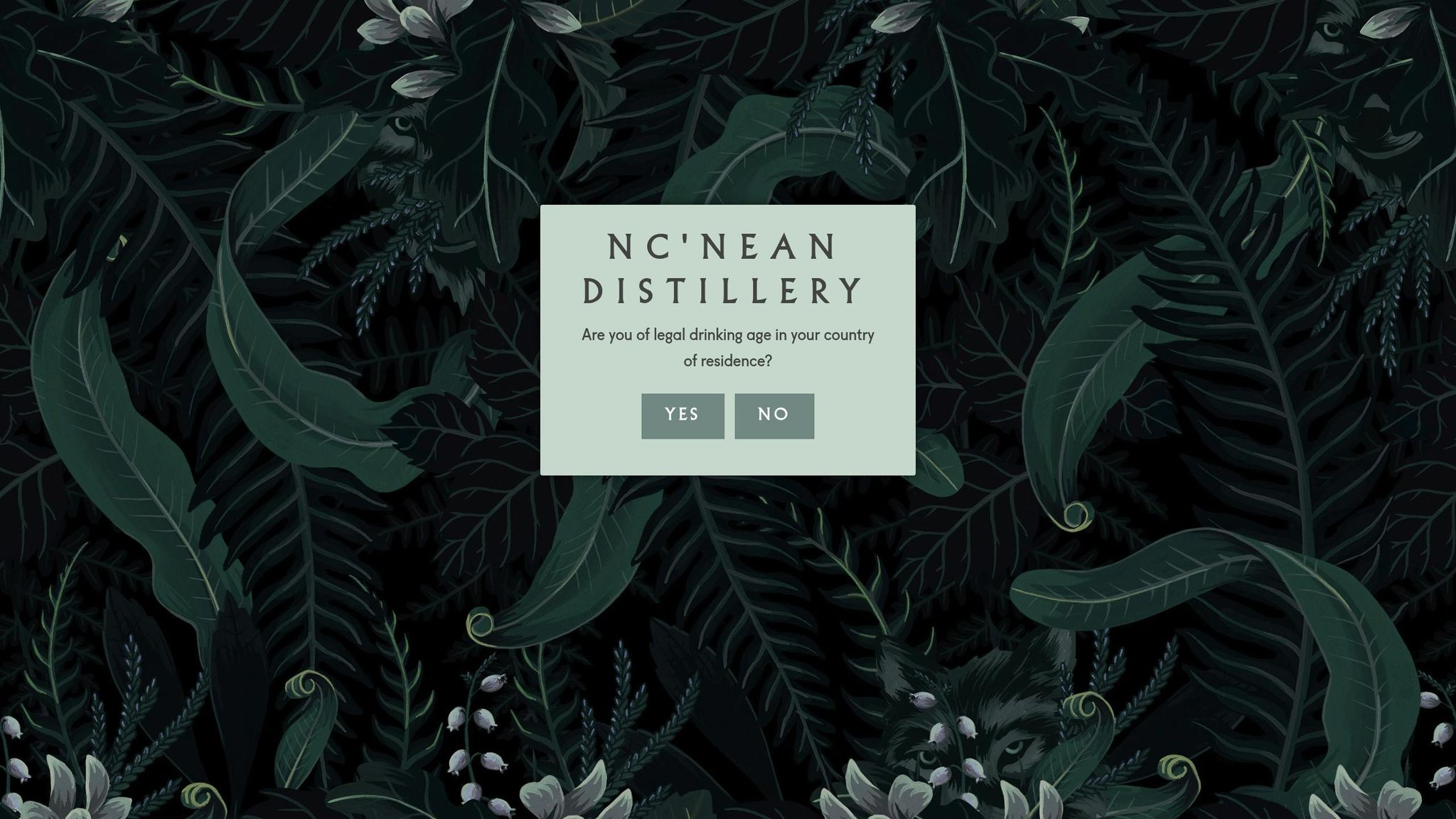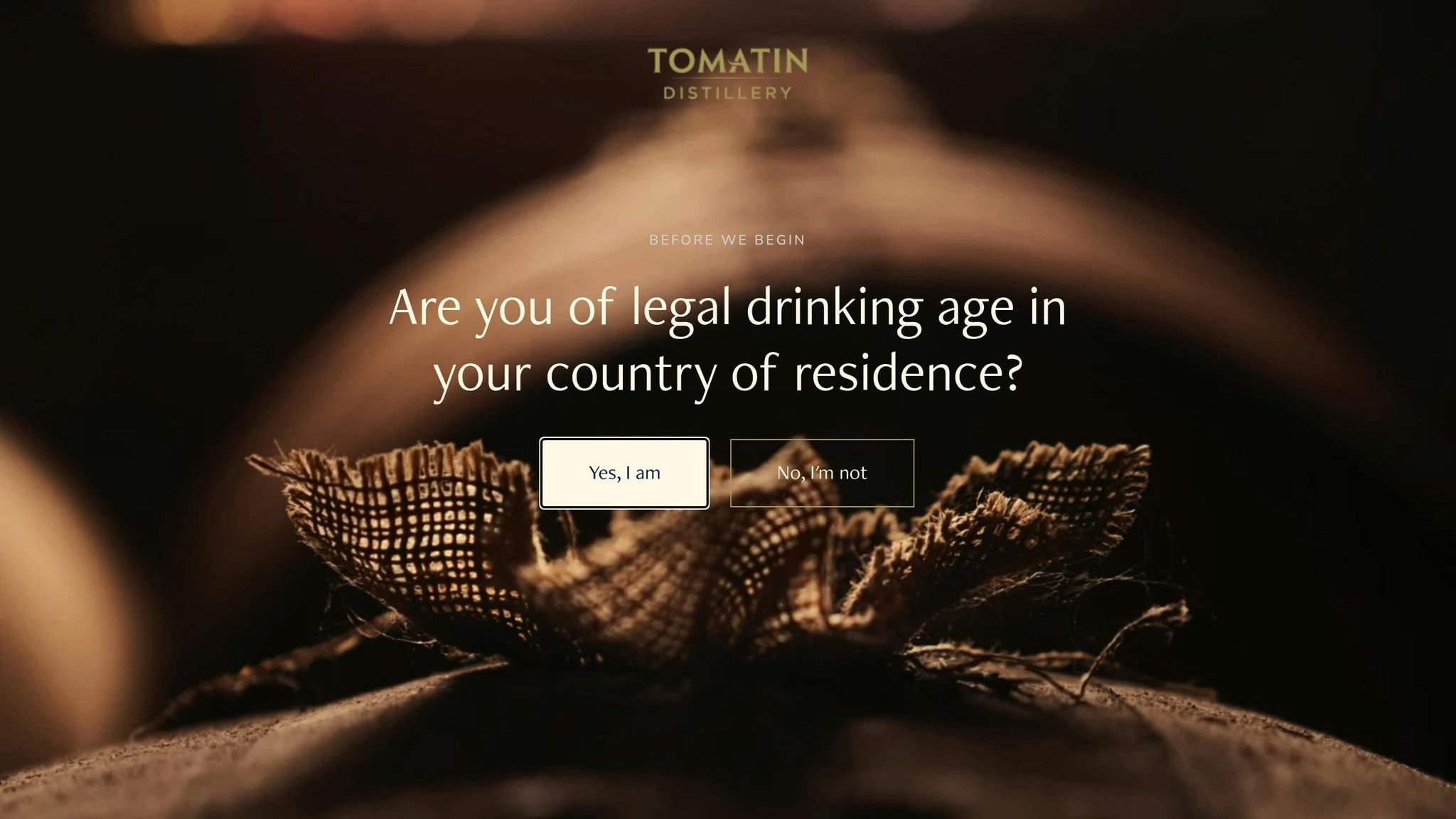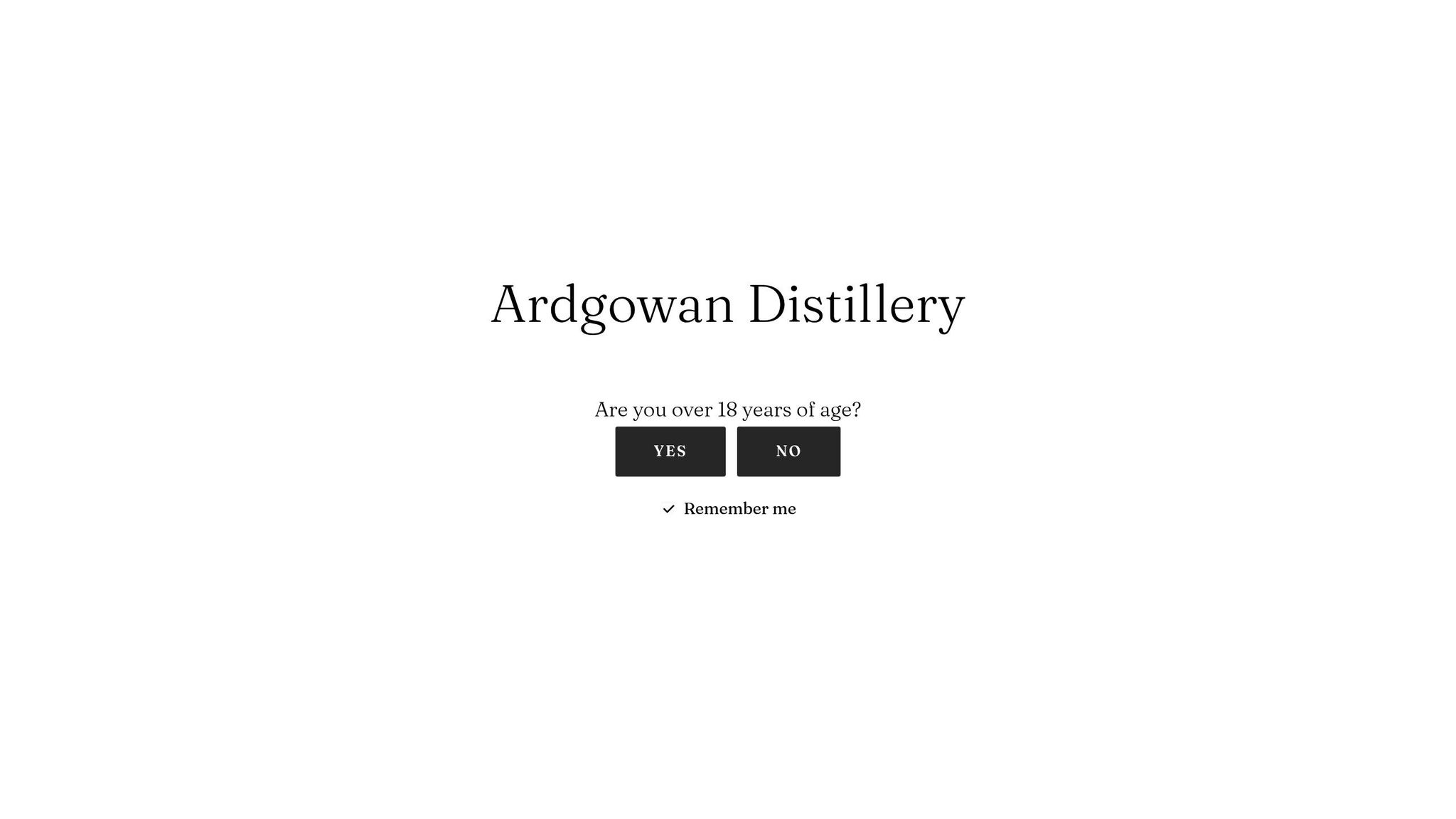The whisky industry is shifting towards greener production methods, with distilleries adopting carbon-neutral practices to reduce emissions and meet consumer expectations. Here are five whisky brands leading the way in eco-friendly production:
- Tomatin: Biomass energy powers 80% of its production, paired with recyclable packaging and innovative waste reuse.
- Nc'Nean: The UK's first verified net-zero distillery, using renewable energy and 100% recycled glass bottles.
- Glenfiddich: Converts production by-products into biogas to fuel its transport fleet, cutting emissions significantly.
- Witchburn Distillery: Powered entirely by renewable energy with advanced heat recovery systems.
- Ardgowan Distillery: Targets carbon-negative status by converting CO₂ into biomethane and using recycled materials in construction.
Each brand employs unique approaches, from renewable energy to waste reduction, to achieve their sustainability goals. These efforts reflect a broader industry focus on reducing environmental impact while maintaining whisky quality.
The Spirit Specialist reviews Nc'Nean Quiet Rebels: Annabel

1. Tomatin

Tomatin Distillery has taken a leading role in whisky production with an eco-conscious approach, earning the title of 'Sustainable Distillery of the Year' at the 2023 Icons of Whisky Awards [4][5]. This Highland distillery has implemented various measures to significantly cut its carbon emissions while still producing high-quality whisky.
Use of Renewable Energy
Back in 2013, Tomatin became Scotland's first distillery to introduce a wood pellet-fuelled steam boiler [2][3][4]. Today, biomass energy powers 80% of its production, with the remaining 20% covered by LPG [2][4].
The distillery sources its wood pellets locally from Balcas in Invergordon, a company that uses renewable energy and raw materials from nearby forests [2][5]. For every tree harvested, two are planted, and the byproducts of woodchip production generate electricity, making the Balcas site carbon neutral [2][5].
Tomatin is also looking ahead to further reduce its carbon emissions. A collaboration with Fred. Olsen Renewables and Caldera focuses on using electricity from the proposed Balnespick Wind Farm, which could generate up to 64.8MW of electricity [3]. James Macnaghten, CEO of Caldera, highlights the potential of this initiative:
"Wind power is an amazing renewable energy source, but its availability doesn't always align with production needs. Our Storage Boilers solve this challenge by capturing wind-generated electricity whenever it's available and storing it as heat until required at a fraction of the cost of electric batteries." [3]
These advancements in renewable energy are matched by Tomatin’s commitment to sustainable bottling.
Sustainable Bottling Materials
Tomatin has made recyclability a core focus for its packaging. All packaging elements are recyclable, except for the gold capsule used on their 36 Year Old whisky [2]. The distillery is actively working to replace this final non-recyclable component to achieve 100% recyclable packaging.
Beyond packaging, Tomatin has found innovative ways to reuse production byproducts, further minimising its environmental footprint.
Waste Management Practices
Tomatin has developed creative methods to repurpose its byproducts. Draff, a byproduct of whisky production, is used to power a biogas plant, while effluent streams are converted into soil improvers for local farms [4][5].
The distillery has also implemented a reed bed water treatment system, which not only reduces environmental impact but also promotes biodiversity by creating habitats for wildlife [2]. In 2021, additional control valves were introduced to the cooling system, resulting in a 50% reduction in water consumption [2][4][7].
More than 60% of the distillery’s vehicle fleet now consists of electric or hybrid vehicles [2][7], showing their commitment to lowering emissions across all operations.
The impact of these efforts has been profound. The biomass boiler alone has reduced carbon emissions by 80%, cutting over 4,000 tonnes of CO2 annually - the equivalent of taking 1,200 family cars off the road [6]. Stephen Bremner, Managing Director at Tomatin Distillery, sums up their approach:
"We are aware that it is very easy to make statements about supporting sustainability and having a care for the environment but it's actions that really count." [4]
Tomatin is also working alongside other Scotch Whisky Association members to achieve the industry-wide goal of net zero emissions by 2040 [4].
2. Nc'Nean
Nc'Nean Distillery stands out as the first whisky distillery in the UK to achieve verified net-zero carbon emissions in its operations. Setting a powerful example, this Highland distillery has reimagined how whisky is made by integrating extensive environmental practices into its production process.
Powered by Renewable Energy
At Nc'Nean, sustainability begins with energy. The distillery runs entirely on renewable energy sources [9]. Its two copper pot stills are fuelled by a biomass boiler that uses locally sourced wood chips, with trees replanted to maintain the forest balance. Additionally, the electricity comes from Engie, a supplier dedicated to low-carbon energy solutions [8][9]. Thanks to these choices, the distillery’s annual production footprint for 2023–24 is just 10.6 tonnes of CO₂ [8].
Water use is another area where Nc'Nean excels. By recycling 100% of the cooling water through a natural pond system, the distillery uses 80% less water compared to traditional methods [9][14]. These measures reflect its commitment to reducing its environmental impact while maintaining high production standards.
Pioneering Sustainable Packaging
In 2020, Nc'Nean made waves by introducing Scotch whisky’s first 100% recycled glass bottles [11]. This change reduces the carbon footprint of each bottle by 40% compared to those made with new glass [12]. The packaging also features cork stoppers with wooden tops, non-toxic water-based inks for printing, and biodegradable wood pulp closures [12]. Gift tubes are made from 90% recycled cardboard, and between 2022 and 2023, 33% of bottles were sold without tubes to further minimise waste [12].
The distillery also launched a bottle return programme for UK customers, saving 280g of carbon per returned bottle and 480g per refilled bottle [12]. These steps showcase Nc'Nean’s dedication to sustainable practices at every stage of production.
Minimising Waste
Nc'Nean has achieved an extraordinary milestone in waste management, diverting 99.97% of its waste from landfills [10]. Nearly all production by-products are either recycled or repurposed, ensuring minimal environmental impact.
Leading the Carbon-Neutral Movement
Nc'Nean’s commitment to reducing emissions is unmatched. As the first UK whisky distillery to reach verified net-zero carbon emissions for scopes 1 and 2, it achieved this 20 years ahead of the industry’s target [9][16]. This accomplishment, verified by Environmental Strategies Limited in 2021, highlights its leadership in sustainable whisky production. The distillery also holds B Corporation certification, scoring 135.6 - far above the UK average of 88 and the median business score of 50.9 [13].
Although its direct operations generate minimal emissions, Nc'Nean transparently reports its total carbon footprint, including supply chain emissions (scope 3), which amounted to 315.5 tonnes for the year. This is about one-tenth of the emissions produced by a similar fossil fuel-powered distillery [8][14].
Founder Annabel Thomas reflects on their journey:
"This feels like our greatest achievement so far. From the moment we started out on this adventure, there have been plenty of people who told us that using renewable energy would be too hard and that organic barley would be impossible to work with. Many even said that using a 100% recycled glass bottle just wasn't the done thing in premium spirits! The net zero certification was interesting as we didn't actually have to do anything differently. We were already operating with net zero emissions as standard practice; we just needed to record our carbon footprint and have it audited." [14][15]
3. Glenfiddich

Glenfiddich has taken a bold step towards reducing its environmental impact with a "closed loop" sustainability programme that turns whisky production waste into clean energy. This initiative has made the Speyside distillery the first to fuel its delivery fleet using biogas derived entirely from its own distilling by-products.
Use of Renewable Energy
In 2021, Glenfiddich introduced a trailblazing project at its Dufftown distillery in Scotland, converting three delivery trucks to run on ultra-low carbon fuel (ULCF) biogas. This biogas is created through the anaerobic digestion of spent barley grains (known as draff) and pot ale, a liquid by-product of whisky production. Both materials, which would typically require disposal, are now being transformed into a renewable energy source. To support this move, the distillery has also set up dedicated on-site fuelling stations for these trucks. This system represents over a decade of research and development aimed at processing 100% of its waste on-site.
Stuart Watts, distilleries director at William Grant & Sons, explained the vision behind this achievement:
"It has taken more than a decade for Glenfiddich to become the first distillery to process 100% of its waste residues on its own site, then to be the first to process those residues into biogas fuel to power its trucks, and finally to be the first to install a biogas truck fuelling station supplied by our on-site renewable energy facility." [17]
This waste-to-energy innovation is seamlessly integrated into Glenfiddich's broader waste management strategy.
Waste Management Practices
Glenfiddich’s approach to waste management is focused on making full use of by-products from whisky production. Instead of discarding draff and pot ale, these materials are processed into biogas, eliminating waste and producing renewable energy to fuel its transport fleet. Each biogas-powered truck helps reduce up to 250 tonnes of CO₂e per year, which is roughly the same as planting 4,000 trees annually [17][19]. Compared to diesel, biogas cuts CO₂ emissions by more than 95% [17].
Carbon-Neutral Aspirations
While Glenfiddich has not yet achieved formal carbon-neutral certification, it has set ambitious goals to align with the Scotch Whisky Association’s industry-wide net-zero target. These include plans to restore Scotland’s peatlands by 2030 and achieve carbon neutrality by 2040 [18]. The biogas transport initiative is a key step in this direction, combining traditional whisky-making with advanced environmental technology.
Claudia Falcone, Glenfiddich’s global brand director, highlighted the alignment of sustainability with the company’s ethos:
"As a family-owned business we think in the long term, whether our focus is on the sustainable measures we employ at the distillery or on producing the world's most awarded single malt. Our green biogas transport fleet is absolutely in line with our brand ethos of 'Where Next' – always challenging ourselves not to rest on our past achievements but to always look for what is coming next." [20]
4. Witchburn Distillery

Witchburn Distillery, located at the former RAF airbase in Machrihanish, is set to become a standout in Scotland's whisky industry. Slated to begin production in late 2024, this Campbeltown distillery is designed to operate as a Net Zero carbon facility, making it one of the most environmentally conscious whisky producers in the country.
Renewable Energy at the Core
The entire distillery runs on renewable energy sourced from local wind farms. Instead of traditional fossil fuel systems, Witchburn employs an electric boiler powered by renewable energy, completely eliminating reliance on carbon-heavy heating methods.
The facility's energy strategy revolves around operating continuously, as explained by Bari Reid, director of Organic Architects:
"The distillery will be located at the disused RAF airbase in Machrihanish and will be powered by 100% green renewable energy sources and the latest in heat and energy recovery systems, establishing Witchburn as one of Scotland's most sustainable distilleries. Capable of producing two million litres of alcohol a year, the distillery will operate 24/7 to ensure that it keeps reusing as much heat and energy as possible." [24]
By running non-stop, the distillery maximises heat recovery, reducing energy waste typically caused by start-stop cycles. This efficient use of energy is integral to Witchburn’s sustainability goals and extends to its approach to waste management.
Smart Waste Management
Witchburn's waste management system is built on the principle of reusing energy wherever possible. Advanced heat recovery systems capture thermal energy from various stages of production and redirect it back into the process. This design ensures that heat generated during distillation is not lost but instead reused throughout the production cycle.
This efficient setup not only reduces overall energy demand but also demonstrates how green practices can scale. The distillery is capable of producing 2 million litres of alcohol annually, with plans for expansion to 4 million litres, proving that sustainability and high production levels can go hand in hand.
Achieving Carbon Neutrality
Witchburn Distillery has been engineered to achieve Net Zero carbon production, earning comprehensive carbon-neutral certification. This achievement reflects a holistic approach to reducing emissions, from energy sourcing to waste management.
Andrew Nairn, the Founding Master Distiller, emphasised the importance of blending traditional whisky-making with modern environmental practices:
"I'm delighted to have the opportunity to work with Organic Architects and Frilli to develop a distillery to produce a truly great Campbeltown Spirit to combine traditional artisan methods of whisky-making with the latest green technology is a once-in-a-lifetime opportunity." [21][22][23]
sbb-itb-128d6c1
5. Ardgowan Distillery

Ardgowan Distillery, nestled in Scotland, is on track to achieve carbon-negative status by 2024. Combining traditional whisky-making with advanced technology, the distillery is redefining what it means to produce whisky in an environmentally conscious way.
The distillery’s commitment goes far beyond standard eco-friendly measures. As Martin McAdam, CEO of Ardgowan Distillery, puts it:
"It was important to us that the Ardgowan Distillery was not only sustainable by today's standards, but set-up to lead the way in terms of sustainability across the industry in the future" [28].
This bold vision has placed Ardgowan at the forefront of carbon-negative whisky production, setting benchmarks for the industry.
Renewable Energy in Action
At the heart of Ardgowan’s energy strategy is a partnership with HGP (Scotland) Ltd, which leverages a patented Methanation system. This system captures CO₂ released during fermentation and combines it with green hydrogen, sourced from renewable energy like wind and solar, to create biomethane [25]. The biomethane then powers the distillery, ensuring fossil fuels are entirely unnecessary.
The distillery also employs Thermal Vapour Recompression (TVR) technology, which captures and reuses steam from distillation. This integrated approach improves efficiency by combining cooling and boiling processes [25].
Ardgowan’s energy use stands at just over 4 kilowatt-hours per litre of alcohol, which is about half the industry average [25]. This remarkable efficiency showcases how renewable energy systems can significantly lower environmental impact while maintaining high performance.
Turning Waste Into Opportunity
Ardgowan has reimagined waste management by transforming by-products into usable resources. In collaboration with Heriot-Watt University's School of Brewing and Distilling, the distillery is exploring innovative ways to reduce carbon emissions. Dr. Jessica Skelton from Ardgowan explains:
"Many manufacturing assessments overlook biogenic CO₂. As a result, these reports fail to consider the by-product's potential. Our goal is to assess the production, capture and potential uses of CO₂ produced at our new one million litre per annum Scotch malt whisky distillery, finding new, sustainable uses that can be applied here and at other Scottish and international distilleries." [29].
This research underscores Ardgowan’s determination to find new applications for fermentation by-products, paving the way for broader industry improvements.
Pushing Beyond Carbon Neutrality
Ardgowan’s ambitious target to achieve carbon-negative operations by 2024 sets it apart. Through its partnership with HGP, the distillery captures all fermentation CO₂ and converts it into green biomethane, which powers its operations while eliminating emissions [27]. This approach not only neutralises its carbon footprint but actively removes CO₂ from the atmosphere [28].
The distillery’s commitment to sustainability is evident in every detail. For instance, the facility’s construction features 97% recycled aluminium roofing, highlighting its focus on sustainable materials [26].
As the distillery states:
"At Ardgowan Distillery, our commitment to sustainability runs deeper than the spirit we produce. From the ground up, our ambition has always been to create a world-class whisky with as light a footprint as possible" [25].
With its holistic approach, Ardgowan is not just producing whisky - it’s setting a powerful example for environmentally responsible practices across the industry.
Brand Comparison Table
Here’s a snapshot of how five leading carbon-neutral whisky brands are embracing sustainability in their operations:
| Brand | Renewable Energy Sources | Bottling Materials | Waste Management Practices | Carbon-Neutral Status |
|---|---|---|---|---|
| Tomatin | Biomass energy powers 80% of production through a wood pellet steam boiler using local forest materials [5]. | - | Production by-products repurposed for animal feed | Carbon-neutral |
| Nc'Nean | Biomass boiler fuelled by local woodchip and green electricity sourced from a renewable supplier [5]. | 100% recycled clear glass bottles [5]. | Closed-loop water systems and efforts to reduce chemical usage [31]. | Fully certified net-zero distillery [5]. |
| Glenfiddich | Green biogas from distilling residues powers its transport fleet [30]. | - | Biogas-powered transport fleet reduces CO₂ emissions by 250 tonnes annually [30]. | Carbon-neutral |
| Witchburn Distillery | Solar and wind power integration. | - | - | Carbon-neutral |
| Ardgowan Distillery | Methanation system converts fermentation CO₂ to biomethane; wind and solar power [25]. | - | - | Carbon-neutral |
Each brand brings its own spin to sustainability, reflecting shared goals but unique methods. For instance, Nc'Nean stands out with its use of 100% recycled clear glass bottles, while Glenfiddich makes strides by powering its transport fleet with green biogas derived from distilling waste, cutting 250 tonnes of CO₂ annually.
Ardgowan Distillery pushes the envelope with its energy-efficient operations, consuming just over 4 kilowatt-hours per litre of alcohol - about half the industry average [25]. Similarly, Tomatin leans on local resources, with 80% of its production powered by wood pellets [5].
Nc'Nean’s Sasha Holt sheds light on their forward-thinking plans:
"We want to work more closely with our barley farmers to reduce the carbon footprint of the barley, we want to find the right refill packaging for our whisky bottles to reduce glass usage and we want to further reduce our chemical usage in the distillery. These are all on the horizon now." [31]
This comparison underscores that there’s no universal formula for achieving carbon neutrality in whisky production. Each distillery tailors its sustainability practices to its unique circumstances, showcasing the industry’s collective commitment to a greener future.
Conclusion
The whisky industry finds itself at a turning point where tradition meets modern responsibility. These five carbon-neutral brands are showing that sustainable practices are not just about protecting the planet - they're also aligning with what consumers care about most. By ensuring that their production processes balance carbon emissions with their output [1], these brands are tackling environmental challenges head-on.
Each has carved out its own path to reducing emissions. Take Nc'nean, for example, with its focus on achieving a net-zero carbon footprint, or Glenfiddich, which has embraced biogas-powered transport. These varied approaches highlight that there’s no one-size-fits-all solution to carbon neutrality, reflecting the industry’s broad and adaptable strategies.
The ripple effect of these efforts goes beyond individual brands. As Tri Vo, Co-founder of Fierce Whiskers, puts it:
"We wanted sustainability to be part of who we are, so from the very beginning, we set out to consider how things could be done sustainably. We really want to invite other brands and competitors to do what we're doing. We don't want to be the first and only; we want to be the beginning of doing things better." [32]
This sense of shared purpose is helping to drive change across the industry. Innovations like heat recovery systems and carbon capture technologies are becoming more widespread, making sustainable practices more achievable for all.
Whisky enthusiasts today expect more from their favourite brands. Master Distiller Brendan McCarron sums it up perfectly:
"The main people who will hold us to account are whisky drinkers. Sustainability isn't marketing, and it's not a trend – it's here to stay. Consumers will be expecting us to do this. I think it will effectively be self-policing, as it all feeds into less waste and less wasted money. Ultimately, it makes sense, and it's the right thing to do." [31]
The message is clear: sustainability is no longer optional - it's essential for the future of whisky.
FAQs
What are the key advantages of whisky distilleries adopting carbon-neutral practices?
Whisky distilleries that embrace carbon-neutral practices stand to gain in many ways. By lowering greenhouse gas emissions and conserving essential resources like water, they significantly reduce their impact on the planet. This not only aligns with environmental responsibility but also boosts their image as a forward-thinking, eco-friendly brand.
On top of that, these practices often translate into cost savings. Energy efficiency improvements and waste reduction can cut down operational expenses. Plus, adopting sustainable methods resonates with eco-conscious consumers, bolsters the distillery's ability to adapt over time, and supports a greener future for the whisky industry.
How do carbon-neutral whisky brands maintain exceptional quality while prioritising sustainability?
Carbon-Neutral Whisky: Balancing Flavour and Sustainability
Whisky brands striving for carbon neutrality are proving that sustainability and craftsmanship can go hand in hand. By sourcing organic ingredients locally, they not only reduce their carbon footprint but also ensure the ingredients are as fresh as possible. This thoughtful approach preserves the integrity of the whisky while being kinder to the planet.
On top of that, many distilleries are turning to modern solutions like renewable energy systems and closed-loop cooling processes. These technologies help cut down on waste and energy use, showing how innovation can complement tradition.
Water conservation is another key focus, with some distilleries running entirely on renewable electricity. Despite these eco-conscious efforts, they maintain the rich, complex flavours whisky lovers cherish. It’s a win-win: premium quality whisky crafted with a commitment to a greener future.
How can whisky lovers support carbon-neutral brands and encourage sustainability in the industry?
Whisky enthusiasts have the chance to make a difference by selecting brands that embrace environmentally conscious practices. This could mean choosing distilleries that rely on renewable energy sources like wind or solar, or those committed to using recyclable packaging and conserving water in their production processes. Backing companies with clear goals to lower carbon emissions or those investing in carbon capture technology can also help push the industry towards a more sustainable future.
Another way to support greener whisky production is by opting for brands that reduce transportation emissions or prioritise locally sourced ingredients to cut down their carbon footprint. By aligning your choices with these values, you can enjoy your favourite drams while playing a part in creating a more eco-friendly whisky industry.


0 comments